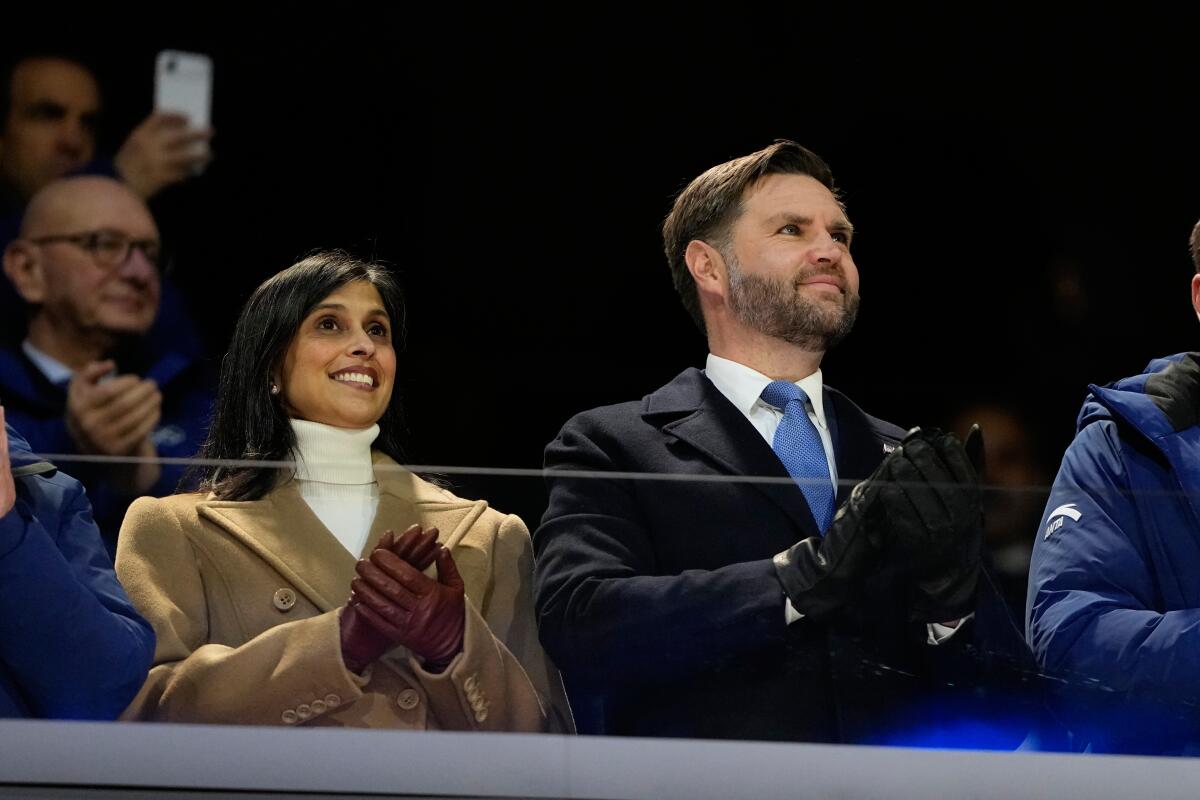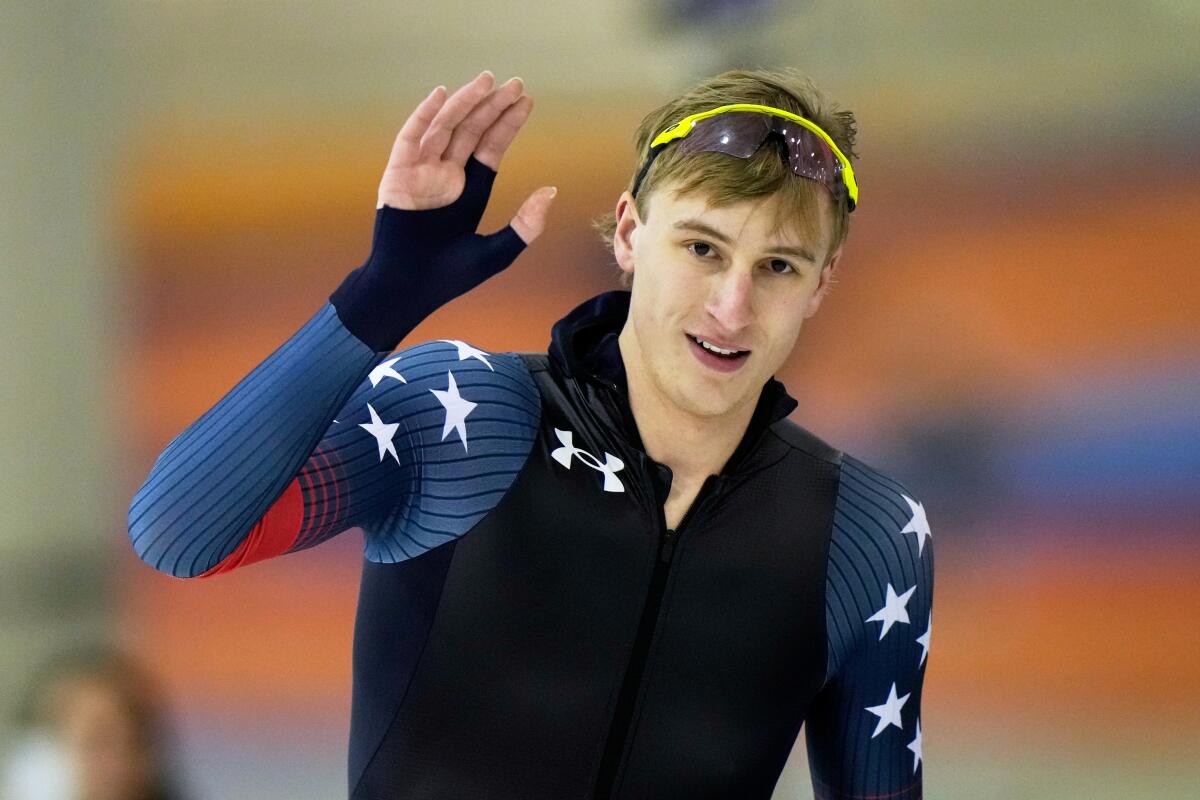From Kevin Baxter: Many of the officials supporting the nearly 250 U.S. athletes competing in this month’s Winter Olympics arrived in Italy last weekend to a greeting they may not have expected: Hundreds of demonstrators packed a square in central Milan to protest the reported plan to deploy U.S. Immigration and Customs Enforcement agents during the Games.
The first events in the 18-day competition, which will be shared by Milan and Cortina d’Ampezzo in the Italian Alps, begin Thursday and the opening ceremony is scheduled for Friday. Against that background, International Olympic Committee President Kirsty Coventry called the agents’ involvement “distracting” and “sad.”
“This is a militia that kills. They are not welcome in Milan,” Mayor Giuseppe Sala said on local radio ahead of the protests, which took place beneath the neoclassical Porta Garibaldi arch in the Piazza XXV Aprile, named for the date of Italy’s liberation from Nazi fascism in World War II.
Many demonstrators blew whistles and carried signs of the five Olympic rings rendered as handcuffs above the words “No ICE in Milan.” One woman held a handmade poster featuring photos of Renee Good and Alex Pretti, the two Minnesotans killed by federal agents last month, alongside Liam Conejo Ramos, the 5-year-old boy in the blue bunny hat who was taken from his home in Minneapolis to a detention facility in Texas.
Continue reading here
Teamwork makes the dream work
From Thuc Nhi Nguyen: Amber Glenn achieved a lifelong goal, sealing her Olympic bid by winning her third consecutive U.S. championship last month. Her first celebration came with her opponents.
“We all deserve it,” Glenn said with her arms wrapped around national silver medalist Alysa Liu and bronze medalist Isabeau Levito.
The spirit of collaboration has brought U.S. figure skating into a new golden age. The 16-athlete team the United States sent to Milan may be the country’s strongest Olympic team in decades. With three reigning world champions and three current Grand Prix final champions, the United States is poised for one of its best Olympic Games ever in figure skating.
Continue reading here
IOC continues to have ‘full trust’ in Casey Wasserman and L.A. Olympic committee
Olympics newsletter
Starting Saturday, you will receive a separate newsletter containing all the Olympics news from our reporters in Italy, including a medal count and TV listings. Sports Report subscribers will automatically get this newsletter, and it should arrive around 3 a.m. in your inbox.
Thursday’s Oly TV/streaming schedule
Thursday’s live TV and streaming broadcasts. All times Pacific.
The first day of full competition begins Saturday.
ALPINE SKIING
2:30 a.m. — Men’s downhill, training | Peacock
CURLING
Mixed doubles (round robin)
1:05 a.m. — Norway vs. U.S. | Peacock
1:05 a.m. — Britain vs. Estonia | Peacock
1:05 a.m. — South Korea vs. Italy | Peacock
1:05 a.m. — Sweden vs. Czechia | Peacock
5:35 a.m. — U.S. vs. Switzerland | USA
5:35 a.m. — Norway vs. Canada | Peacock
10 a.m. — Canada vs. Italy | USA
10:05 a.m. — Czechia vs. Britain | Peacock
10:05 a.m. — Estonia vs. Sweden | Peacock
10 a.m. — Switzerland vs. South Korea | Peacock
2 p.m. — Norway vs. U.S. (delay) | CNBC
HOCKEY
Women (group play)
3:10 a.m. — Sweden vs. Germany | Peacock
5:40 a.m. — Italy vs. France | Peacock
7:40 a.m. — U.S. vs. Czechia | USA
12:45 p.m. — Finland vs. Canada | USA
SNOWBOARDING
10:30 a.m. — Men’s big air, qualifying | USA
Checking in on Dodgers’ commitment
From Bill Shaikin: Not long after Pacific Palisades and Altadena had burned, Gov. Gavin Newsom summoned reporters and television cameras to Dodger Stadium. Newsom stepped behind a podium dropped within a stadium parking lot, with a commanding view of Los Angeles as the backdrop.
He was there to unveil LA Rises, a signature initiative under which the private sector and philanthropists could unite to help Southern California rebuild and recover.
The most valuable player that day: Mark Walter, the Dodgers’ chairman and controlling owner. The big announcement: Walter and two of his associated charities — his family foundation and the Dodgers’ foundation — would contribute up to $100 million as “an initial commitment” to LA Rises.
One year later, Newsom’s initiative has struggled to distinguish itself amid a panoply of wildfire relief efforts. LA Rises has delivered $20 million to date, including $7.8 million from Walter’s family foundation, according to Newsom’s office.
Continue reading here
Dodger Stadium tour guides failed to unionize. Here’s why they’re getting raises anyway
Les Snead has a lot on his plate
From Gary Klein: If he returns for an 18th NFL season, Rams quarterback Matthew Stafford will almost certainly demand a significant raise. And receiver Puka Nacua is positioned to potentially break the bank with an extension.
Those are just two issues Rams general manager Les Snead will deal with in the coming weeks and months as the franchise retools for the 2026 season.
Snead, who along with coach Sean McVay signed extensions this week, said Wednesday during a videoconference with reporters that the “opportunity to continue shouldering my responsibility” along with McVay and other executives for owner Stan Kroenke was “the opportunity of a lifetime.”
Continue reading here
Angels sign Trey Mancini
Former Baltimore slugger and cancer survivor Trey Mancini is taking another shot at a major league comeback after agreeing to a minor league contract with the Angels that includes an invitation to big league spring training.
The Angels on Wednesday listed the infielder among their 27 non-roster invitees to camp in Tempe, Ariz.
The 33-year-old Mancini has batted .263 with 129 homers and 400 RBIs over parts of seven seasons, but he hasn’t played in the major leagues since 2023. He began his career by playing parts of six seasons with the Orioles, hitting a career-high 29 homers in 2019.
Continue reading here
Jaxson Hayes suspended for one game
From Broderick Turner: Lakers center Jaxson Hayes has been suspended one game without pay for pushing a Washington Wizards mascot during pregame introductions, the NBA announced Wednesday.
The Lakers played the Wizards at Capital One Arena on Friday night.
Hayes will miss the Lakers’ game against the Philadelphia 76ers on Thursday night at Crypto.com Arena.
Continue reading here
Darius Garland discusses joining Clippers
Darius Garland could not have been more in transition than he was Wednesday night on his first day with his new team.
Officially traded earlier in the day from the Cleveland Cavaliers to the Clippers for 11-time All-Star James Harden, Garland talked about his upheaval during halftime of Wednesday’s game between his current and former teams, a game the Cavaliers won, 124-91.
“I knew about it. It wasn’t a shock, though,” the two-time All-Star said. “It’s the business of basketball. Cleveland was great to me and my family, and I have respect for all of those guys over there. … Seven years was a really long time, and it was great. I’m glad I’m here now. The next chapter in my book.”
Continue reading here
Clippers box score
NBA standings
UCLA women rout Rutgers by 40
Headlined by first and third quarter dominance, No. 2 UCLA women’s basketball picked up a 86-46 win over Rutgers (9-14, 1-11) at Pauley Pavilion on Wednesday night.
Kiki Rice led the Bruins (22-1, 12-0 Big Ten) with 17 points and seven rebounds, while Gabriela Jaquez got things started, scoring 10 of her 14 points in the first quarter.
Rutgers, playing without its two leading scorers in Nene Ndiaye and Imani Lester, committed 18 turnovers that the Bruins converted into 25 points.
Continue reading here
UCLA box score
Big Ten standings
Kings acquire Artemi Panarin
The Kings acquired high-scoring left wing Artemi Panarin from the New York Rangers on Wednesday for a conditional third-round draft pick and prospect Liam Greentree.
The Kings then signed Panarin to a two-year, $22-million contract that will keep the Russian forward in Los Angeles through the 2027-28 season.
The trade ends weeks of uncertainty around the future of the 34-year-old Panarin, who hadn’t played since Jan. 26 while the Rangers held him out in anticipation of trading their top scorer in each of the past seven consecutive seasons. He currently leads New York with 57 points in 52 games.
Continue reading here
Kings lose to Kraken
Shane Wright scored twice to lead the Seattle Kraken to a 4-2 win over the Kings on Wednesday night.
Vince Dunn and Adam Larsson also scored and Chandler Stephenson and Frederick Gaudreau each had two assists for the Kraken, who have won five of their last six games. Joey Daccord made 25 saves.
Andrei Kuzmenko scored both of the Kings’ goals and Darcy Kuemper made 19 saves.
Continue reading here
Kings summary
NHL standings
Super Bowl
Sunday
at Santa Clara
Seattle vs. New England
3:30 p.m. PT, NBC, Peacock, Telemundo, KLAC AM 570
Halftime show: Bad Bunny
National anthem: Charlie Puth
Odds: Seahawks favored by 4.5 points
Over/Under: 45.5 points
This day in sports history
1913 — The New York State Athletic Commission bans boxing matches between fighters of different races.
1919 — Charges against Cincinnati’s Hal Chase of throwing games and betting against his team are dismissed by National League president John Heydler. Two weeks later, Chase is traded to the New York Giants.
1948 — After landing the first double axel in Olympic competition, Dick Button becomes the first American to win the Olympic gold medal in figure skating. Gretchen Fraser becomes the first U.S. woman Olympic slalom champion.
1960 — Bill Russell grabs 51 rebounds in the Boston Celtics’ 124-100 victory over the Syracuse Nationals. Russell is the first player in NBA history to pull in 50 or more rebounds.
1972 — Bob Douglas is the first Black person elected to Basketball Hall of Fame. Known as “The Father of Black Professional Basketball,” Douglas owned and coached the New York Renaissance from 1922 until 1949.
1976 — Austrian Franz Klammer wins the Olympic gold medal in the downhill at Innsbruck, Austria. Bill Koch wins a silver in the 30-kilometer cross-country race to become the first American to win a medal in a Nordic event.
1980 — Gordie Howe plays his 23rd and final All-Star Game. Howe doesn’t score, but sets up the final goal of the game, by Real Cloutier, in the Wales Conference’s 6-3 win against the Campbell Conference at Joe Louis Arena in Detroit.
1990 — Notre Dame bucks the College Football Association and becomes the first college to sell its home games to a major network, agreeing to a five-year contract with NBC beginning in 1991.
1991 — Dave Taylor of the Kings has two assists in a 3-2 win over the Philadelphia Flyers to become the 29th player in NHL history with 1,000 points.
1999 — Patrick Roy, at 33, becomes the youngest goalie in NHL history to earn 400 wins when he makes 26 saves in the Colorado Avalanche’s 3-1 win against the Red Wings at Joe Louis Arena.
2003 — Bode Miller of the United States captures his first major title, winning the gold medal in the combined at the world championships in St. Moritz, Switzerland.
2006 — Pittsburgh wins a record-tying fifth Super Bowl, but its first since 1980 with a 21-10 win over the Seattle Seahawks.
2009 — Tennessee’s Pat Summitt becomes the first Division I basketball coach — man or woman — to win 1,000 games after her Lady Vols beat Georgia 73-43.
2011 — Dejen Gebremeskel of Ethiopia wins the men’s 3,000 at the Boston Indoor Grand Prix, after losing his right shoe at the start of the race. Gebremeskel stays close to the lead throughout the race and takes over on the final lap to finish in 7:35.37. Britain’s Mo Farah finishes second in 7:35.81.
2012 — Eli Manning and the Giants one-up Tom Brady and the Patriots again, coming back with a last-minute score to beat New England 21-17 for New York’s fourth Super Bowl title.
2017 — Tom Brady leads one of the greatest comebacks in sports, let alone Super Bowl history, lifting New England from a 25-point hole to the Patriots’ fifth NFL championship in the game’s first overtime finish. The Patriots score 19 points in the final quarter, including a pair of two-point conversions, then marches relentlessly to James White’s two-yard touchdown run in overtime beating the Atlanta Falcons 34-28.
2022 — Six days before his 50th birthday, 11-time world surfing champion Kelly Slater wins his eighth Pipeline title beating 22-year old Hawaiian Seth Moniz in the final.
Compiled by the Associated Press
Until next time…
That concludes today’s newsletter. If you have any feedback, ideas for improvement or things you’d like to see, email me at houston.mitchell@latimes.com. To get this newsletter in your inbox, click here.











